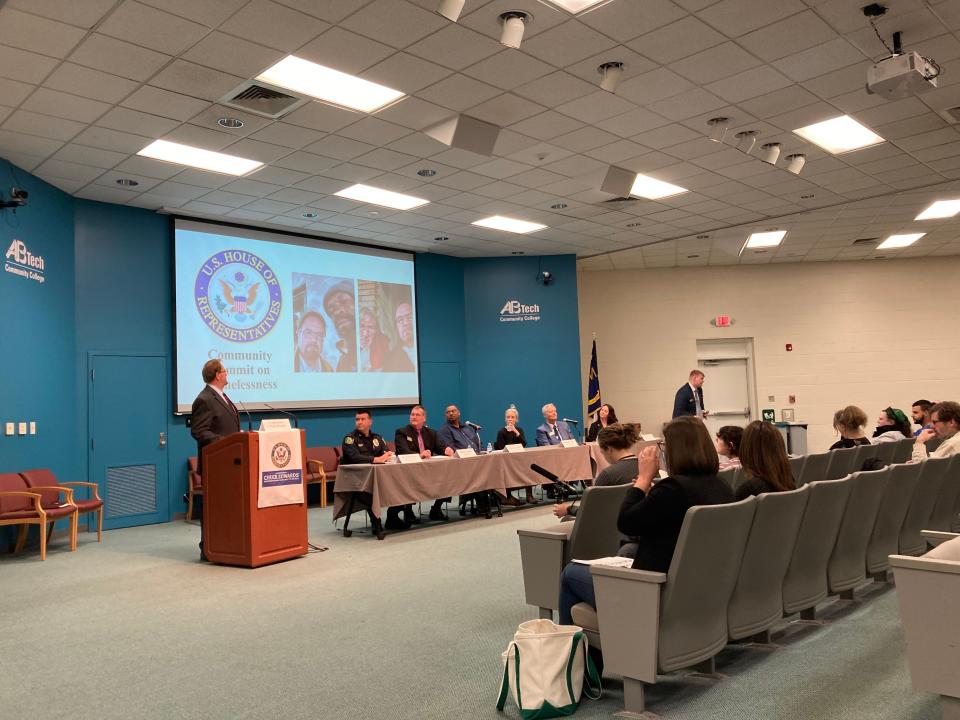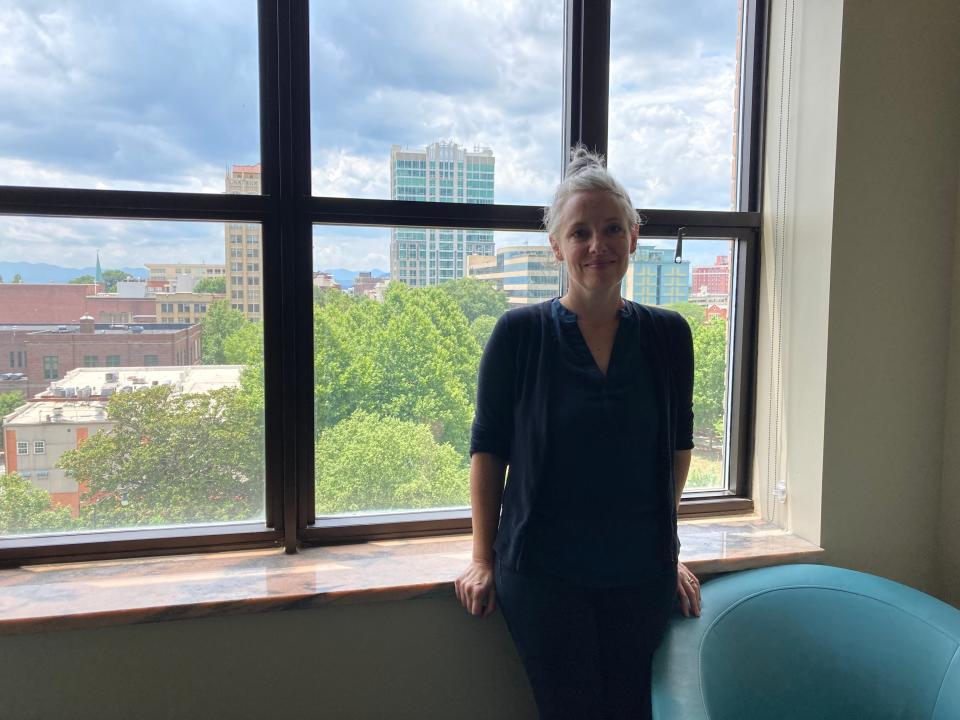'Rising rates' of homelessness? Chuck Edwards hosts summit in Asheville
ASHEVILLE - A conversation around homelessness organized by Western North Carolina's Republican Rep. Chuck Edwards continuously circled back to a central issue ― affordable housing.
Frustrations from audience members simmered, often echoed by the panelists, as they considered the steep cost of housing and a homelessness crisis accelerating nationwide.
In a Jan. 23 news release, Edwards said the summit's goal was to "discuss the rising rate of homelessness in North Carolina's 11th district," encompassing much of WNC. The Jan. 26 meeting at Asheville-Buncombe Technical Community College drew about 60 people.
Edwards told the Citizen Times that once elected in 2022, he "learned the problem of homelessness goes far beyond Hendersonville (his home county) and Asheville, which is where I've always perceived the epicenter in this district to be." He hoped to call attention to rural areas, as well, and said in both instances, "it's not getting better, it's getting worse."

What do the numbers show?
Following nationwide trends, unsheltered homelessness rose sharply in Asheville at the onset of the pandemic. The latest point-in-time count numbers from a January 2023 tally found 573 people experiencing homelessness inn Asheville, 171 of which are unsheltered. Overall, homelessness was down 10% from the year prior, but remained higher than pre-pandemic levels.
The city's next point-in-time count is Jan. 30. Results are typically released in the spring.
Across the country, numbers are up. The U.S. Department of Housing and Urban Development's 2023 Annual Homelessness Assessment Report, published in December, found that the 2023 count was the highest number of people found to be homeless on a single night since reporting began in 2007.
Experiences of homelessness increased nationwide across all household types. Between 2022 and 2023, it rose 12%, or by roughly 70,650 people.

Addressing the rising rate of homelessness was first identified as a priority by Asheville City Council in March 2022, as well as affordable housing, a lack of which community leaders say has exacerbated the crisis, along with the pandemic.
In May 2022, the city contracted with Washington, D.C.-based National Alliance to End Homelessness to create a report laying the framework for reducing unsheltered homelessness in Asheville. The report was released in January 2023. In the last year, the city's Homeless Initiative Advisory Committee, the governing body for its Continuum of Care, has begun the work of implementing recommendations, including an entire system overhaul.
A housing issue
“It boils down to a housing issue. An affordable housing issue,” said Murphy Mayor Tim Radford.
He sat on the panel along with Emily Ball, head of the city's homeless strategy division; Asheville Police Department Capt. Jonathan Brown; the heads of two area homeless services providers; and Hendersonville's Mayor Pro Tempore Lyndsey Simpson.
In the last two years, Radford said he noticed a shift that he attributed to slim shelter pickings elsewhere in Cherokee County and surrounding areas, and a housing crisis that began with the Great Recession, supply further strained by COVID-19.
It's a similar plight that led Simpson to pitch the idea of an affordable housing steering committee to Hendersonville City Council. She said the discrepancy between the cost of housing and employee pay makes it difficult for businesses to retain employees, and 25% of Henderson County households are cost burdened, data from the North Carolina Housing Coalition found.
That same study found fair market rents have increased 69% in the last five years.
"When we moved here in 2016, our rent was $875. And when we bought our house two years ago, we left and our rent was almost $1,300 a month. Nothing changed in our apartment. There were no new appliance, no new fittings, nothing," she said. "It just went up, exponentially."
"This topic frustrated me to no end," Simpson said, noting that area median income is not in line with cost of housing, meaning 80% AMI, which technically qualifies as affordable, is out of reach for most.
In Asheville that's an annual income of $47,600 for one person, or $54,000 for a two-person household.
Living wage increase: Asheville and Buncombe County living wage increases 9% amid soaring housing costs
Pushback against federal funds
Research by Gregg Colburn, author of "Homelessness is a Housing Problem," found only housing-related factors, including median rent and rental vacancy rates, correlated with regional rates of homelessness.
Though people often point to factors like mental health and addiction as the fundamental causes of homelessness, many subject matter experts say differently ― the true cause is lack of housing.
It's a principle followed by "Housing First," an approach to ending homelessness that prioritizes quickly and successfully connecting people to permanent housing without preconditions and barriers to entry. The approach is supported by HUD as well as the National Alliance to End Homelessness, which recommended training on the practice as part of its report to the city and Buncombe County.

But not all area providers are supportive of the model. Panelist Micheal Woods, president of Western Carolina Rescue Ministries, called Housing First a "failed policy" being dictated by Washington, D.C.
"One of the things that I would love to do, is I would love to challenge our elected officials, Congressman Edwards included. I believe that Buncombe County, Asheville, WNC knows what's best for WNC. And for many years, we've allowed HUD to dictate from D.C. the way funding should be spent in our community, and it's exacerbated the problem," Woods said.
He called for Asheville service providers, like himself, to dictate the parameters of the HUD funding. Specifically, he argued, that in prioritizing the "Housing First" model, he felt the funding was too narrow.
Currently, Asheville and Buncombe County receive about $2 million annually in federal funds to address homelessness, a combination of Continuum of Care funding from HUD and Emergency Solutions Grant dollars from the N.C. Department of Health and Human Services. In each case, HIAC invites applications and a workgroup reviews them and makes recommendations to the full board. In 2023, HIAC submitted funding requests totaling $2.2 million for organizations including Helpmate, Homeward Bound and the city of Asheville.
Projects included housing support for domestic violence survivors, permanent supportive housing and emergency shelter.
The state and HUD then review applications and make final decisions or awards and contract directly with funded agencies.
"Most things in Washington, D.C., were put in place for a reason at one time, but the needs change and it's rare that the policies change. So I'm really eager to hear what he has to say, specifically, about how the funding stream can be restructured to better serve the people of WNC," Edwards said of Woods' comments on restructuring HUD funding.
When asked about the specifics of the structure, and that applications were coming from city and county providers themselves, Edwards said he would "have to listen more specifically to Mr. Woods, and so the takeaway I was referring to is I would like to have more dialogue with him to get his ideas on how that funding might be better structured to serve our community."
More: A year after homelessness report: Buncombe, Asheville look back on what's been done
More: East Asheville Ramada Inn property slated for homeless housing lost to foreclosure
The way forward
During a brief question-and-answer session, an audience member drew applause with a question around tourism dollars: Why can't the lodging tax dollars that comes back to Buncombe County be put toward affordable housing?
The answer, for now, is that maybe it can be. For the first time, a roughly $10 million slice of the county's hotel and other room occupancy tax dollars, which go to the Buncombe County Tourism Development Authority, can be allocated to projects that benefit the community at large — which some people have interpreted to mean affordable housing.
But thorny answers around legislative restrictions — or other multilayered issues, like homelessness — often don't leave people satisfied.

In the panel's final minutes, Ball, with the city of Asheville, said despite the complications, she had hope for the way forward.
"I honestly think that we can do this," Ball said. "I really feel like a true believer in the work of the Continuum of Care, and I know that's kind of wonky policy speak, but if we come together actually as a community, I honestly think we can build a system of services that is responsive to the needs of folks in our community, but there is no way to do that if not together."
As HIAC's restructuring is underway, the city is inviting people to join the membership body of the Continuum of Care. Soon, that body will vote on a new charter and board of directors, with committees of experts appointed to make and implement plans, evaluate performance, pursue and allocate funding, and develop an effective homeless service system under the board's direction.
HIAC will next meet Feb. 8 at 9 a.m. on the first floor of City Hall. Meetings are open to the public.
More: How many people are homeless in Asheville? 2024 point-in-time count begins Jan. 30
More: Debunking homelessness myths: Asheville experts take on 5 common misconceptions
Sarah Honosky is the city government reporter for the Asheville Citizen Times, part of the USA TODAY Network. News Tips? Email [email protected] or message on Twitter at @slhonosky. Please support local, daily journalism with a subscription to the Citizen Times.
This article originally appeared on Asheville Citizen Times: Affordable housing dominates Chuck Edwards Asheville homeless summit
